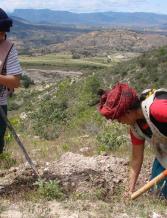
A Forest Landscape Initiative Demonstrating Environmental Benefits and Empowering Women
Learning From Success: An investment project in Mexico is enabling women from Indigenous and local communities to take an informed and active role in sustainable forest management.
Link: 17279-WB_FOLUR Success1-WEB.pdf778.06 KB
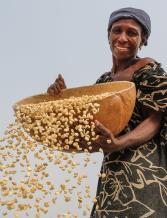
Tackling Gender and Inclusivity Challenges: Lessons Learned from FOLUR Country Projects
The benefits of engaging women in proactive leadership roles across Food Systems, Land Use and Restoration (FOLUR) program country projects are beginning to bear fruit.
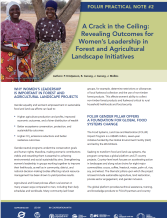
A Crack in the Ceiling: Revealing Outcomes for Women’s Leadership in Forest and Agricultural Landscape Initiatives
Women farmers hit by drought in Kenya. World Bank/Flore de Preneuf
Link: 17196-WB_FOLUR Practical Note2.pdf732.56 KB
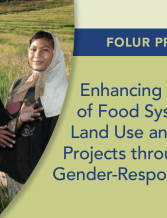
Enhancing Effectiveness of Food Systems, Land Use and Restoration Projects through Gender-Responsive Actions
This FOLUR Practical Note summarizes outcomes from a series of virtual events on gender equality hosted by the FOLUR Gender Learning Programme for the Food and Agricultural Commodity Systems Community in the context of the FOLUR Impact Program.
Link: WB_FOLUR Gender Brief.pdf856.6 KB
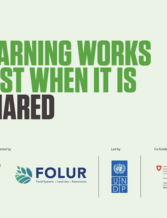
Join the Food & Agricultural Commodity Systems Community
Engage with the FOLUR Community from within the Food & Agricultural Commodity Systems Community of Practice to develop skills and share knowledge
Link:Food & Agricultural Commodity Systems Community of Practice

Measuring women’s leadership for sustainability in landscape projects with the W+ standard
Women’s leadership has been instrumental in ensuring equitable participation, benefits and decision-making in the design and implementation of integrated landscape projects.
Link: Women's Leadership presentation _Mar27_2024.pdf4.74 MB
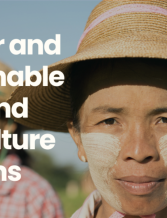
Gender Responsive Commodity Value Chains (Course 3)
Gender and FOLUR Course 3 focused on gender-responsive commodity value chains and gender considerations in farmers’ support investments.
Link: FOLUR merged presentations on gender.pdf12.07 MB
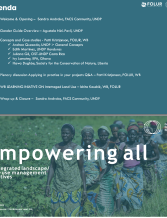
Empowering All in Integrated Landscape/Land-Use Management Initiatives (Course 2)
FOLUR projects are about empowering all kinds of people to work together to conserve natural resources more sustainably.
Link:Gender Learning Programme (Course 2, Module 1)
Link: FOLUR_GLP Course 2_Module 2.pdf9.53 MB

Slides: Introduction to Gender Equality Concepts in the Context of FOLUR (Course 1)
Capacity development for gender responsive interventions in FOLUR country projects.
Link:Video: Gender Learning Programme (Course 1)
Link: Capacity Development for Gender Responsive Interventions in FOLUR country projects.pdf918.87 KB

Pre-reading: Introduction to Gender Equality Concepts in FOLUR courses
Learn about gender relations and how people of different genders interact with each other, including how power and resources are divided between them.
Link:Video: Gender Learning Programme (Course 1)
Link: Pre-reading-Gender Equality Concepts and Resources.pdf1.5 MB
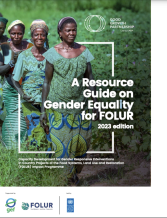

Women’s caucus builds unity at GEF Assembly to tackle agro-environmental challenges
International development meetings resulting in social and environmental commitments by governments and multinational companies are rife. At the recent Global Environment Facility Assembly in Vancouver there were encouraging signs of change.

Empowering marginalized voices: The global Food Systems, Land Use and Restoration Impact Program
As we head to Vancouver to join a gathering of environmental leaders from 185 countries at the 7th GEF Assembly next week, we are reflecting on why this presents a key opportunity for women and others working on gender issues and food systems change.
Link: Gender Plenary-FOLUR-Annual Meeting 2023.pdf25.09 MB
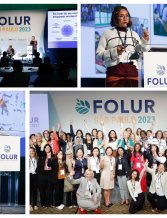
Annual Meeting 2023: Acting on critical gender issues in FOLUR countries
At the Food Systems, Land Use and Restoration Impact Program (FOLUR) annual meeting held in Sao Paulo, Brazil with country project team participants from 24 countries, a session on innovative approaches to gender integration in FOLUR interventions was held.
Link: Gender Plenary - Annual Meeting 2023.pdf25.09 MB

A presentation on the W+ Standard by founder Jeannette Gurung
A unique framework developed by Jeannette Gurung, the founder and executive director of Women Organizing for Change in Agriculture and Natural Resource Management (WOCAN), was designed to certify projects that create increased social and economic benefits for women participating in environment,…
Link:Bringing women's empowerment to markets: A chat with W+ founder Jeannette Gurung
Link: W+ presentation PROGREEN FOLUR webinar_2 Feb 2023 .pptx15.92 MB
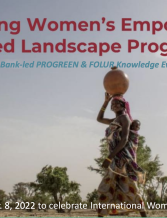
Supporting women's empowerment in integrated landscape programs
A presentation by FOLUR and PROGREEN, a World Bank multi-donor trust fund, shared knowledge and lessons learned from inclusive landscape approaches ongoing in different environments empowering vulnerable groups.
Link: Womens Empowerment Webinar IWD Mar8 slides.pdf3.99 MB

Gender and inclusion in forest landscape restoration
A self-paced online course aims to provide a comprehensive overview of gender and social inclusion, and to build capacity for various stakeholders engaged in forest landscape restoration work.Authors: M. Elias, Alliance Bioversity International & CIAT; M. Gilligan, EnGen Collaborative; M.…
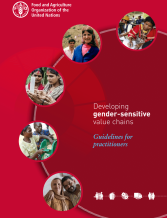
Developing gender-sensitive value chains: Guidelines for practitioners
What efforts need to be made to effectively mainstream gender in agri-food value chain projects and programmes? When can a value chain intervention be considered "gender-sensitive"? What actions can be implemented to address gender inequalities along the chain? These guidelines aim to respond to…
Link: FAO-Guidelines-Gender-Sensitive-VCs.pdf2.46 MB

Good practices for integrating gender equality and women’s empowerment in climate-smart agriculture programmes
Women farmers are more exposed than men to climate variability and extremes, due to their limited entitlements and assets, and the restricted access to the social and natural resources required for adaptation and resilience building. In some communities it is only men who hold the right to…
Link: CARE-FAO-Good-Practices-Gender-Equality-in-CSA-Programs.pdf8.21 MB
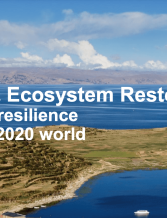
Gender & Ecosystem Restoration: unlocking resilience for a post-2020 world
The urgency of degradation, which affects 1.5 billion people — from drylands to forests to coasts — is unprecedented and unrelenting. Gender gaps are pervasive – and undermine restoration goals, while gender-responsive action delivers results. Learn more here.
Link: cbd-gender-ecosystem-restoration-en.pdf1.64 MB

Gender transformative good practices: A compendium of 15 good practices
The Compendium is a product of the Joint Programme on Gender Transformative Approaches for Food Security and Nutrition implemented by the U.N. Food and Agriculture Organization, the International Fund for Agricultural Development and World Food Programme. It is funded by the European Union.
Link: Gender-Transformative-Good-Practices-FAO-WFP.pdf4.09 MB
